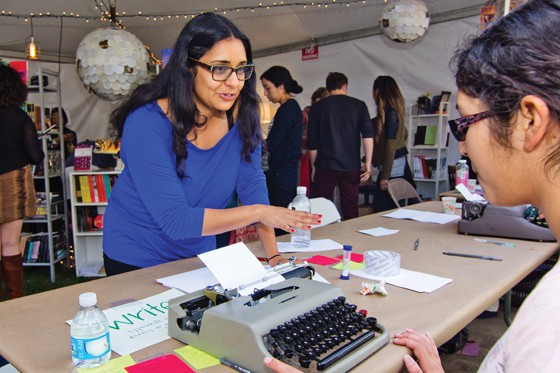How did you get involved with the smokin’ hottest press in the world?
I was working as an editor of the now-defunct AsianWeek newspaper in San Francisco when Ed Lin’s Waylaid came across my desk. I thought it was one of the best books I had ever read, and still count it as one of my top five books. I had written about Waylaid then, and when Kaya Press was temporarily relocated to the Bay Area later, I helped organize an event for Ed Lin’s next book This is a Bust. Around the same time, I wrote about Ed at Hyphen Magazine, where I was an editor.
Kaya publisher Sunyoung Lee had also taken a look at an anthology that I co-edited— Indivisible: An Anthology of Contemporary South Asian American Poetry —and in her usual insightful, thoughtful way, had given us editors the confidence to move forward at a crucial junction.
I ended up moving to L.A. after living in India for a year and a half and reached out to my friend and Kaya Press Board Member Patty Wakida to pick her brain about L.A. opportunities. She said that Kaya was now based out of USC and looking for a Publicity Director. The rest is history…
Briefly describe your role in Kaya.
Though I started as Publicity Director, after my first year of working at Kaya Press I transitioned to Managing Editor. This basically means that I wear many hats—I continue to coordinate efforts to promote Kaya Press books and authors, along with working closely with Sunyoung to manage staff and coordinate our production process, plus planning events, and acquisitions. Really, I see my role here as doing everything I can to support and execute all the needs of Kaya Press.
What do you think is the current situation of the publishing industry, in terms of technology, accessibility, and diversity?
I definitely think technology—from on-line journals to the ease of self-publishing—is a game changer for the publishing industry. I have also been teaching fiction workshops through Writing Workshops Los Angeles for the past three years, and I often encourage my students to submit their work widely since so many journals and contests accept submissions online. It’s still work, but you can do it while sitting at your computer. Yet, technology and e-books don’t seem to have replaced or shifted the need and desire for books that one can hold in their hand. I think social media is changing the conversation around diversity in publishing. This past year has been one moment after the other where issues of racism in the literary world (the Best American Poetry controversy, the criticisms of AWP, etc.) have been called out and put on blast on the Internet. I believe that is
changing the conversation, and hopefully that will have an effect on the larger publishing landscape.
What advice would you give aspiring writers of color?
The greatest advice for all writers everywhere is to write everyday, and find a community of writers who supports you. I am always pushing my writer of color friends to apply to VONA or Kundiman or Cave Canem or Canto Mundo, or seek out other writers who can give you that kind of support.
Recommend us a book by a writer of color!
One of my favorite novels of all time is Salvage the Bones by Jesmyn Ward. I dare you to read it without crying.


Leave a Comment
We'd love to know what you think.